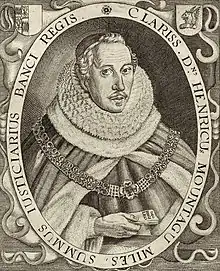Henry Montagu, 1st Earl of Manchester
Henry Montagu, 1st Earl of Manchester (c. 1563 – 7 November 1642) was an English judge, politician and peer.[1]
Henry Montagu 1st Earl of Manchester | |
|---|---|
 | |
| Lord High Treasurer | |
| In office 1620–1621 | |
| Preceded by | In Commission George Abbot as first lord |
| Succeeded by | Lionel Cranfield, 1st Earl of Middlesex |
| Lord Chief Justice of England | |
| In office 1616–1621 | |
| Preceded by | Edward Coke |
| Succeeded by | James Ley |
| Personal details | |
| Born | 1563 |
| Died | 7 November 1642 (aged 78/79) |
| Alma mater | Christ's College, Cambridge |
Life
He was the 3rd son of Edward Montagu of Boughton and grandson of Sir Edward Montagu, Lord Chief Justice of the King's Bench from 1539 to 1545, who was named by King Henry VIII one of the executors of his will, and governor to his son, Edward VI.[2]
Henry was born at Boughton, Northamptonshire, about 1563. He was educated at Christ's College, Cambridge,[3] was admitted to Middle Temple on 6 November 1585 and was Called to the Bar on 9 June 1592. He was elected recorder of London in 1603, and in 1616 was made Chief Justice of the King's Bench, in which office it fell to him to pass sentence on Sir Walter Raleigh in October 1618.[2]
In 1620, he was appointed Lord High Treasurer, being raised to the peerage as Baron Montagu of Kimbolton, Huntingdonshire, and Viscount Mandeville. He became President of the Council in 1621, in which office he was continued by Charles I, who created him Earl of Manchester in 1626. In 1628, he became Lord Privy Seal, and in 1635 a commissioner of the treasury.[2]
Although from the beginning of his public life in 1601, when he first entered Parliament, Manchester had inclined to the popular side in politics, he managed to retain to the end the favour of the King. He was a judge of the Star Chamber, and one of the most trusted councillors of Charles I. His loyalty, ability, and honesty were warmly praised by Clarendon. In conjunction with Coventry, the Lord Keeper, he pronounced an opinion in favour of the legality of ship money in 1634.[2]
Family
Manchester was married three times: first, Catherine Spencer, daughter of Sir William Spencer of Yarnton, Oxfordshire; second, Anne Holliday (née Wincot), in 1613, daughter of William Wincot of Langham, Suffolk, and widow of Sir Leonard Holliday, third, Margaret Crouch, on 26 April 1620, daughter of John Crouch of Cornbury, Hertfordshire, who died in 1653.[1]
He was succeeded by his eldest son, Edward Montagu, Viscount Mandeville, from his first marriage. The second son of Henry and Catherine was Walter Montagu, the courtier and abbot.[4]
One of his sons by his third wife, Margaret Crouch, was George Montagu, father of Charles Montagu, created Earl of Halifax in 1699, and James Montagu, Attorney General from 1708 to 1710.
Notes
- Rigg, James McMullen (1894). . In Lee, Sidney (ed.). Dictionary of National Biography. 38. London: Smith, Elder & Co.
-
 One or more of the preceding sentences incorporates text from a publication now in the public domain: McNeill, Ronald John (1911). "Manchester, Earls and Dukes of". In Chisholm, Hugh (ed.). Encyclopædia Britannica. 17 (11th ed.). Cambridge University Press. p. 543.
One or more of the preceding sentences incorporates text from a publication now in the public domain: McNeill, Ronald John (1911). "Manchester, Earls and Dukes of". In Chisholm, Hugh (ed.). Encyclopædia Britannica. 17 (11th ed.). Cambridge University Press. p. 543. - "Montagu, Henry (MNTG582H)". A Cambridge Alumni Database. University of Cambridge.
- Cooper, Thompson (1894). . In Lee, Sidney (ed.). Dictionary of National Biography. 38. London: Smith, Elder & Co.
External links
- Record for Henry Montagu, 1st Earl of Manchester on thepeerage
- UK Parliamentary Archives, Papers of the Earls of Manchester
| Political offices | ||
|---|---|---|
| Preceded by The Lord St John of Bletso The Duke of Lennox |
Lord Lieutenant of Huntingdonshire jointly with The Lord St John of Bletso 1624–1627, 1629–1636 1624–1642 |
English Interregnum |
| Legal offices | ||
| Preceded by Edward Coke |
Lord Chief Justice 1616–1621 |
Succeeded by James Ley |
| Preceded by The Archbishop of Canterbury as First Lord of the Treasury |
Lord High Treasurer 1620–1621 |
Succeeded by The Earl of Middlesex |
| Peerage of England | ||
| New title | Earl of Manchester 1626–1642 |
Succeeded by Edward Montagu |
| Viscount Mandeville 1620–1642 | ||
| Baron Montagu of Kimbolton 1620–1626 | ||
.svg.png.webp)